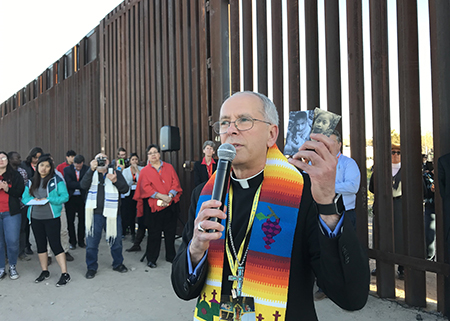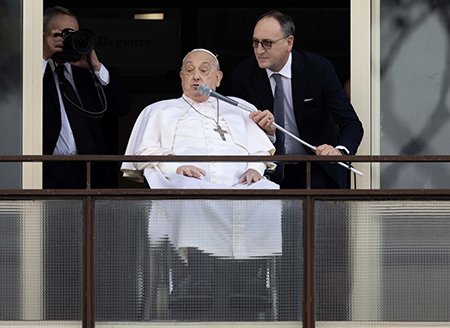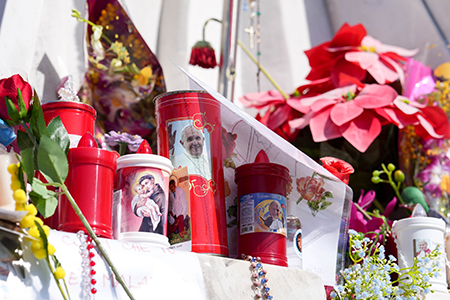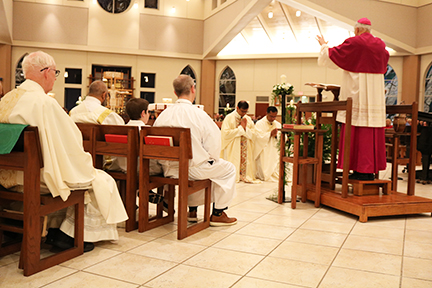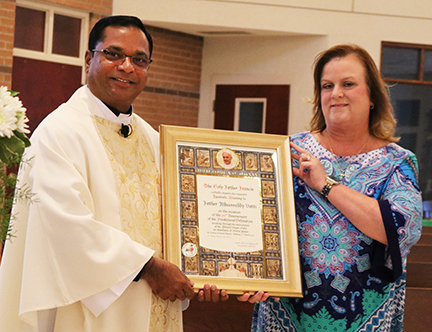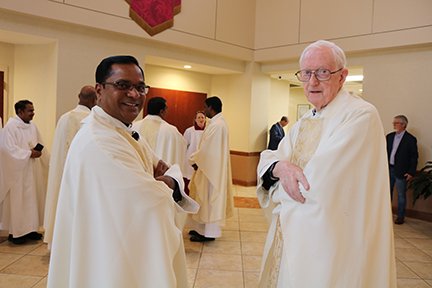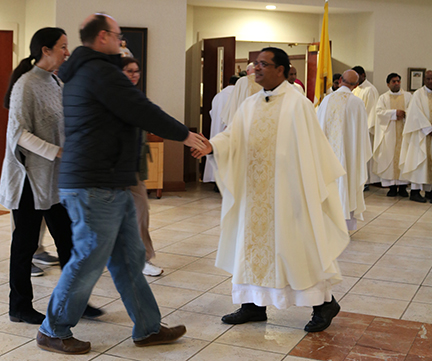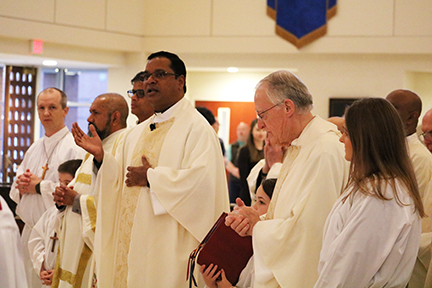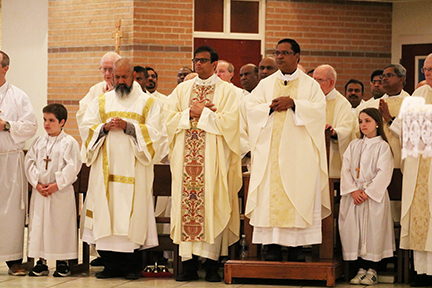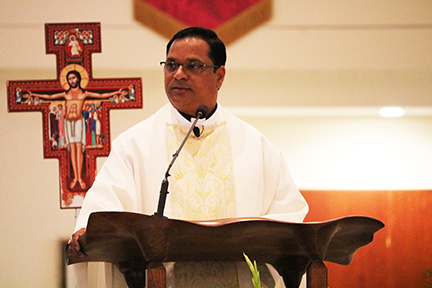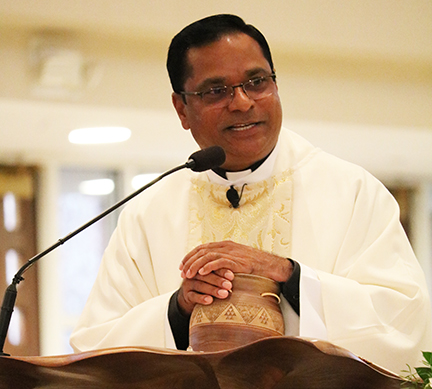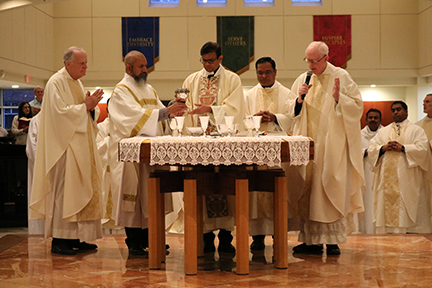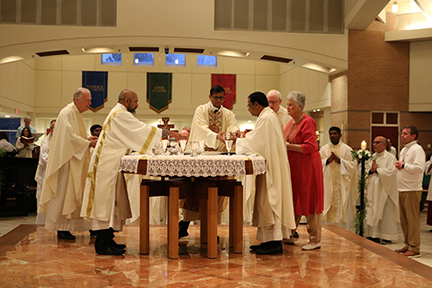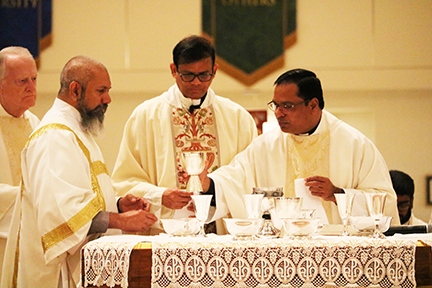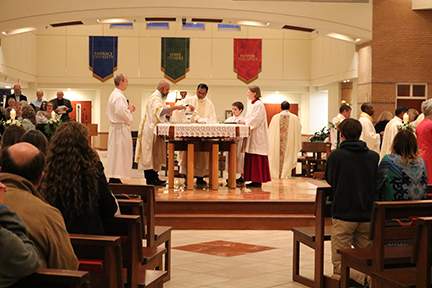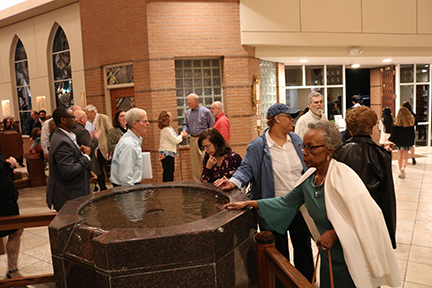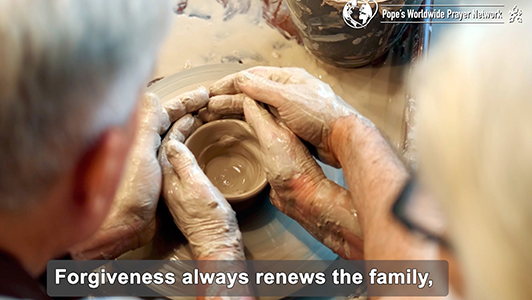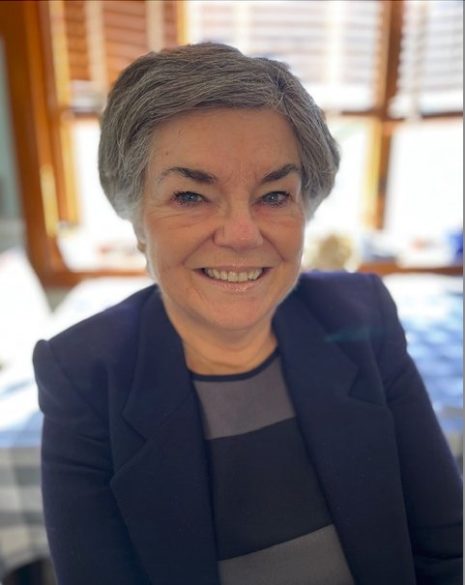Por Junno Arocho Esteves
(OSV News) – Mientras el Papa Francisco continúa su proceso de recuperación en el Hospital Gemelli de Roma – en donde está internado desde el 14 de febrero – católicos en su Diócesis de Roma y en todo el mundo se han unido en oración por su salud.
En un comunicado publicado en el sitio web diocesano el 19 de febrero, el cardenal Baldassare Reina, vicario general de la Diócesis de Roma, afirmó que los fieles estaban siguiendo “con atención y confianza la condición de salud de nuestro obispo, el Papa Francisco”.
“Conscientes del valor de la oración comunitaria, pedimos a todas las parroquias y comunidades religiosas que dediquen una hora de adoración eucarística en silencio antes de la celebración de la Misa”, dijo el cardenal Reina. “Como una gran familia, pedimos al Señor que le conceda a nuestro obispo la fortaleza que necesita para enfrentar este momento delicado”.
En la Argentina natal del pontífice, los fieles acudieron a la Catedral Metropolitana de Buenos Aires – diócesis que el entonces arzobispo Jorge Mario Bergoglio dirigió antes de su elección en 2013 – y a otras parroquias para orar por la salud del Santo Padre.
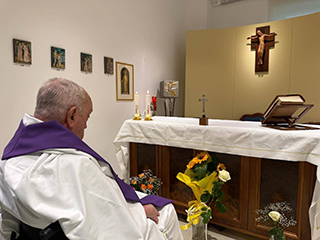
En una carta enviada al Papa Francisco el 17 de febrero, en nombre de los católicos de la arquidiócesis, el arzobispo Jorge García Cuerva pidió por su recuperación “para que fortalecido, puedas seguir sirviendo a la Iglesia del mundo entero en el ejercicio del ministerio que el mismo Dios te confió y que con tanto amor y dedicación llevas adelante”.
El arzobispo Cuerva aseguró que mientras el Papa continúa su recuperación en el Hospital Gemelli, se ofrecerán oraciones por su salud y sus intenciones “en todas las celebraciones de la Eucaristía de estos días”.
“Encomendándote a la Virgen Santa, en el recuerdo imborrable de los días en que eras obispo propio del rebaño que vive en esta ciudad”, le escribio.
Fieles en la Villa 31 de Buenos Aires, un barrio marginal donde el Papa Francisco solía celebrar Misa cuando era arzobispo, también se unieron en oración por su antiguo obispo. En declaraciones a The Associated Press, Claudia Doldán, residente de la villa, dijo sentirse triste “porque está delicado de salud “.
“Lo conozco al Papa. En su momento, Bergoglio lavaba los pies acá en el barrio. Todo el barrio nos unimos a rezar, el Papa está en nuestras oraciones”, afirmó Doldán.
Las oraciones también llegaron desde Canadá. En un mensaje del 19 de febrero, el obispo William McGrattan de Calgary, Alberta, presidente de la Conferencia Canadiense de Obispos Católicos, aseguró que los fieles y obispos del país “estamos orando por la pronta recuperación del Santo Padre, el Papa Francisco, mientras continúa guiando a la Iglesia con valentía y generosidad de espíritu”.
Católicos en Asia, incluida China, se han unido en oración por el papa. El sitio web de noticias católicas xinde.org en China instó a sus lectores a “orar por el Papa a través de la Santa Misa, la Adoración Eucarística, el Rosario, la Coronilla de la Divina Misericordia y otras devociones”.
“Acompañemos también al papa con el ayuno y la penitencia, orando para que el Señor lo asista y lo bendiga con una pronta recuperación”, decía el sitio web.
Mientras el frágil alto el fuego en Gaza continúa, católicos en esa región también han orado por la salud del Papa. En un video publicado por DRM News, un medio de comunicación en línea, un palestino no identificado en Gaza expresó su gratitud al Papa Francisco, quien “se ha comunicado con nosotros en medio de la guerra y los conflictos que Gaza ha soportado”.
“Desde su cama de hospital sigue preocupándose por sus hijos en Gaza”, dijo. “Esto nos da tranquilidad y confianza de que estamos bien, de que estamos en sus pensamientos. Oramos por él y le deseamos una pronta recuperación”.
A pesar de la gravedad de su estado, que lo ha obligado a cancelar todos sus eventos y reuniones, el Papa no quiso faltar a su llamada diaria con el padre Gabriel Romanelli, párroco de la Iglesia de la Sagrada Familia en Gaza.
En una entrevista con Vatican News publicada el 17 de febrero, el padre Romanelli reveló que el Papa Francisco lo llamó “los dos primeros días de hospitalización”.
“Nos preguntó cómo estábamos, cómo estaba la situación, nos envió su bendición. La gente le mostró su cercanía, él les agradeció y les dio su bendición”, dijo el padre Romanelli.
“Escuchamos su voz. Es cierto, está más cansado”, continuó el párroco. “Él mismo dijo: ‘Tengo que cuidarme’. Pero su voz era clara, nos escuchaba bien”.
Sin embargo, en la noche del 16 de febrero, cuando la complejidad de la condición del papa se volvió más seria, los feligreses en Gaza “no tenían expectativas de comunicación con el Papa”.
No obstante, el padre Romanelli dijo que el Papa “me envió un pequeño mensaje diciéndome que agradecía mi cercanía y mis oraciones y correspondía con su bendición”.
“Esperamos que la recuperación se produzca pronto y que pueda volver a San Pedro para continuar su misión y su trabajo”, dijo el sacerdote. “Las oraciones continúan sin cesar”.
(Junno Arocho Esteves escribe para OSV News desde Malmö, Suecia.)

